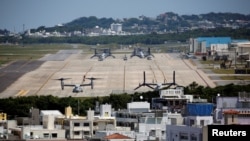The U.S. inability to contain the coronavirus at home is beginning to have a bigger impact on U.S. military missions overseas, some analysts warned Monday, as infections among American service members surge in Japan and South Korea.
Japanese officials in Okinawa prefecture on Sunday said more than 60 coronavirus cases have been reported at two U.S. Marine bases over the past week, including Marine Corps Air Station Futenma and Camp Hansen. On Monday, Japan’s Asahi Shimbun reported 32 more cases at the Futenma base.
In response, the U.S. military placed Marines, their families, and contractors in Okinawa on lockdown, severely restricting their off-base access.
In light of recent clusters of positive COVID-19 cases on Okinawa, Marine Forces Japan has implemented additional HPCON measures to limit the spread of the novel coronavirus. These measures have been put into place to protect our forces, our families, and our local communities. pic.twitter.com/2uq9SzSNB0
— III MEF Marines (@IIIMEF) July 11, 2020
At a press conference Sunday, Okinawa Governor Denny Tamaki said he was “shocked” at the new infections and that he has “strong doubts” about measures taken by the U.S. military to prevent the spread of the virus.
It’s not clear where the Okinawa cases originated, but the Kyodo news agency reported the U.S. Marine Corps had experienced two “localized clusters" of individuals who tested positive.
Arrivals from US
The outbreak among U.S. service members in South Korea appears more contained, stemming mainly from recent arrivals of troops from the United States.
Over the past two weeks, at least 34 service members or affiliated individuals have tested positive after arriving in South Korea from the United States, according to statements from the U.S. military in South Korea.
Four others during that period have tested positive after arriving from elsewhere, including Europe and Japan, the statements said.
That is a sharp increase from previous months, when the U.S. military in South Korea reported only a slow trickle of new cases.
Missions complicated?
The infections create a precarious situation for South Korea and Japan, which have had relative success in containing the coronavirus.
Japan has reported under 1,000 virus-related deaths, while South Korea has seen fewer than 300. The United States, meanwhile, has reported almost 135,000 deaths.
With U.S. coronavirus cases and deaths continuing to soar, some analysts warn that Washington’s inability to control the virus is complicating U.S. missions in Japan and South Korea, which host nearly 80,000 U.S. troops and serve as the bedrock for the U.S.-led security order in East Asia.
"Washington's poor public health policy and inability to contain the spread of COVID-19 has affected military readiness,” says Daniel Pinkston, a former Air Force linguist who now teaches international relations at Troy University in Seoul. COVID-19 is the disease caused by the coronavirus.
“Infection within the U.S. military...could affect combined training with allies as well as the ability of the U.S. to fulfill its alliance commitments,” he added. “This can reduce the confidence of allies and lead to miscalculation by adversaries.”
In a statement, U.S. Forces Korea (USFK) said it remains "at a high level of readiness with less than 1% of its active duty service members who are currently confirmed positive for COVID-19."
The USFK statement also highlighted its safety precautions:
Upon arrival in South Korea, all U.S. troops and affiliated individuals are required to undergo COVID-19 testing and must enter quarantine or isolation for 14 days depending on the result. They must then test negative at least once before being released.
Military drills: delayed again?
The new infections are raising the possibility the U.S. and South Korea will not be able to conduct an annual military exercise.
Last week, South Korea’s Yonhap news agency reported both countries appear increasingly likely to scale back or cancel the drills.
The U.S. and South Korea already canceled a major joint military exercise earlier this year.
Canceling or modifying the drills again could have a “serious impact” on the combined defense posture, says retired South Korean lieutenant general Chun In-bum.
“The exercises are quite important. They only occur twice a year. They used to occur four times a year,” he says.
An official with South Korea’s Ministry of National Defense told VOA that Washington and Seoul are in close consultation on the matter but that no decision has been made.
This spring's exercise was canceled in February, when South Korea was experiencing one of the world’s first major outbreaks.
Within weeks, South Korea had contained the virus, thanks to its strategy of widespread testing, data-driven contact tracing, and quick isolation of those impacted.
The U.S. military in South Korea, too, has been praised for its quick and effective response to the virus.
More concern in South Korea
But as the world’s coronavirus hotspot has shifted to the United States, some South Koreans have become more concerned.
During a briefing Sunday, South Korean Prime Minister Chung Sye-kyun said he was worried about the increase in USFK cases, calling on South Korean authorities to work with U.S. officials to strengthen quarantine measures.
“Residents of Pyeongtaek, where USFK is located, have already expressed concerns and complaints several times about being exposed to the virus," says Ki Mo-ran, an epidemiologist who has advised the South Korean government on its coronavirus response.
“If our soldiers make contact with [U.S. soldiers], there is a high risk that the number of infections in our military will increase as well," she told VOA.
David Maxwell, who specializes in the U.S.-South Korea military relationship at the Washington-based Foundation for Defense of Democracies, says he would not be surprised if the coming exercise is postponed.
“Yes, we need to train,” Maxwell said. “However, if there is an outbreak among the entire ROK/US Combined Forces Command staff, it will have a debilitating effect on more than readiness.”
Lee Juhyun contributed to this report.




